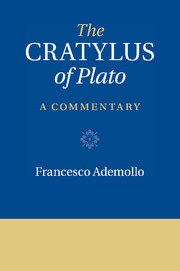Book contents
- Frontmatter
- Contents
- Preface
- Preliminary note
- List of abbreviations
- Introduction
- 1 Cratylus' naturalism (383a–384c)
- 2 Hermogenes' conventionalism (384c–386e)
- 3 Naturalism defended (386e–390e)
- 4 Naturalism unfolded (390e–394e)
- 5 Naturalism illustrated: the etymologies of ‘secondary’ names (394e–421c)
- 6 Naturalism illustrated: the primary names (421c–427e)
- 7 Naturalism discussed (427e–433b)
- 8 Naturalism refuted and conventionalism defended (433b–439b)
- 9 Flux and forms (439b–440e)
- Appendix 1 The text of 437d10–438b8
- Appendix 2 Some interpolations and non-mechanical errors in W and δ
- References
- I General index
- II Index of ancient texts
- III Index of Greek expressions
- IV Index of words discussed in the Cratylus
1 - Cratylus' naturalism (383a–384c)
Published online by Cambridge University Press: 25 October 2011
- Frontmatter
- Contents
- Preface
- Preliminary note
- List of abbreviations
- Introduction
- 1 Cratylus' naturalism (383a–384c)
- 2 Hermogenes' conventionalism (384c–386e)
- 3 Naturalism defended (386e–390e)
- 4 Naturalism unfolded (390e–394e)
- 5 Naturalism illustrated: the etymologies of ‘secondary’ names (394e–421c)
- 6 Naturalism illustrated: the primary names (421c–427e)
- 7 Naturalism discussed (427e–433b)
- 8 Naturalism refuted and conventionalism defended (433b–439b)
- 9 Flux and forms (439b–440e)
- Appendix 1 The text of 437d10–438b8
- Appendix 2 Some interpolations and non-mechanical errors in W and δ
- References
- I General index
- II Index of ancient texts
- III Index of Greek expressions
- IV Index of words discussed in the Cratylus
Summary
THE THESIS
First approach to the thesis (383ab)
Our dialogue, like the Philebus, opens by bringing us in medias res:
he. So do you want us to let Socrates here join in our discussion?
cr. If you like.
(383a1–3)The situation seems to be the following. Hermogenes and Cratylus are on their way to the countryside (440e) and have been discussing for some time without reaching an agreement. Then they meet Socrates. Hermogenes suggests that they should inform him of the content of their discussion; Cratylus agrees.
But what is the issue Hermogenes and Cratylus were debating just before meeting Socrates? Hermogenes does not explain this in so many words. Rather, he immediately sets forth Cratylus' own view:
he. Cratylus here, Socrates, says there is a natural correctness of name for each of the beings [ὀνόματος ὀρθότητα εἶναι ἑκάστῳ τῶν ὄντων φύσει πεφυκυῖαν], and what some conventionally agree to call something, uttering a bit of their voice and applying it to the thing, is not a name [καὶ οὐ τοῦτο εἶναι ὄνομα ὃ ἄν τινες συνθέμενοι καλεῖν καλῶσι, τῆς αὑτῶν φωνῆς μόριον ἐπιφθεγγόμενοι]; but there is a natural correctness of names for both Greeks and barbarians, the same for all [ἀλλὰ ὀρθότητά τινα τῶν ὀνομάτων πεφυκέναι καὶ Ἕλλησι καὶ βαρβάροις τὴν αὐτὴν ἅπασιν].
(383a4–b2)This first part of Hermogenes' exposition is articulated into three coordinate clauses:
(C1) ‘There is a natural … beings’ (a4–5),
(C2) ‘What some … not a name’ (a5–7),
(C3) ‘There is … same for all’ (a7–b2).
- Type
- Chapter
- Information
- The Cratylus of PlatoA Commentary, pp. 23 - 36Publisher: Cambridge University PressPrint publication year: 2011



